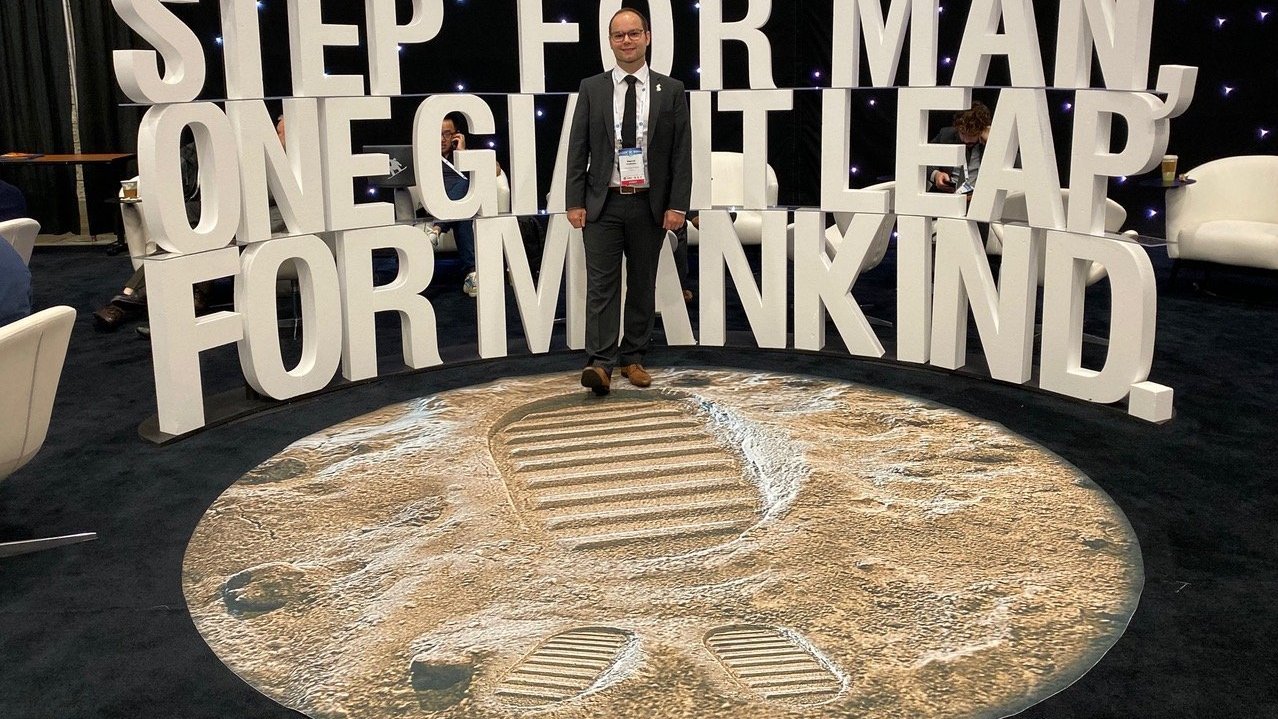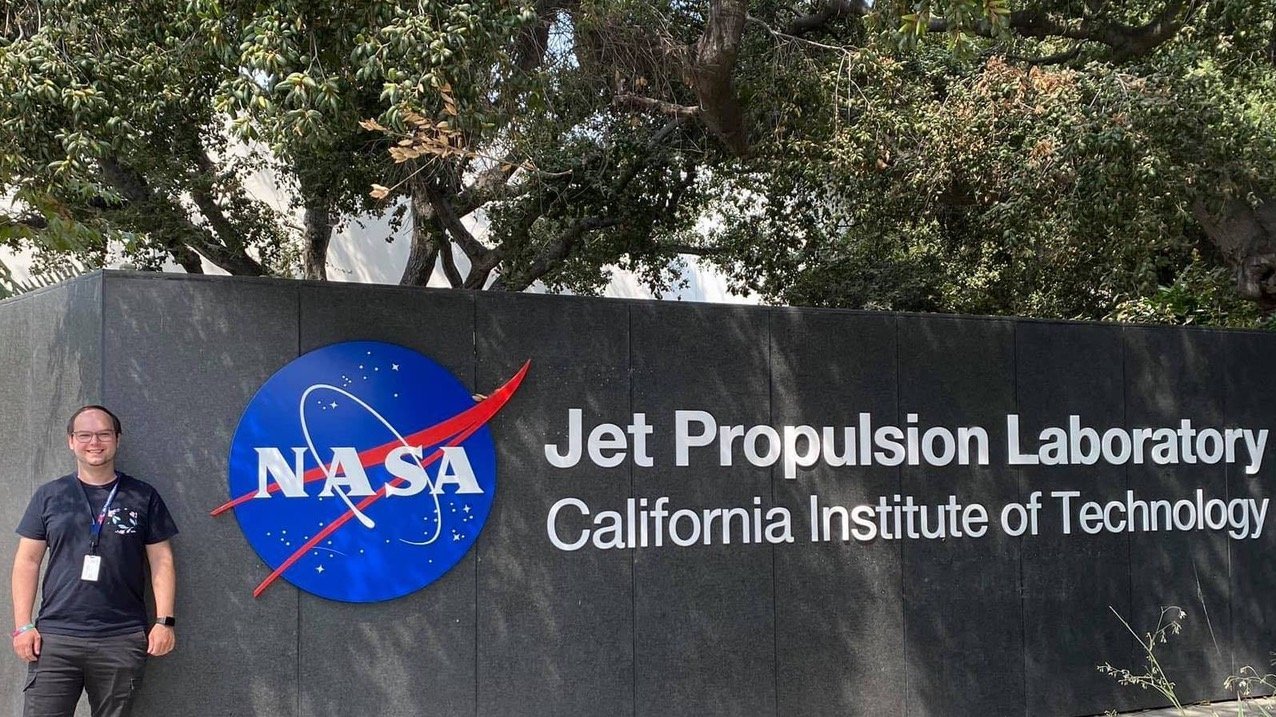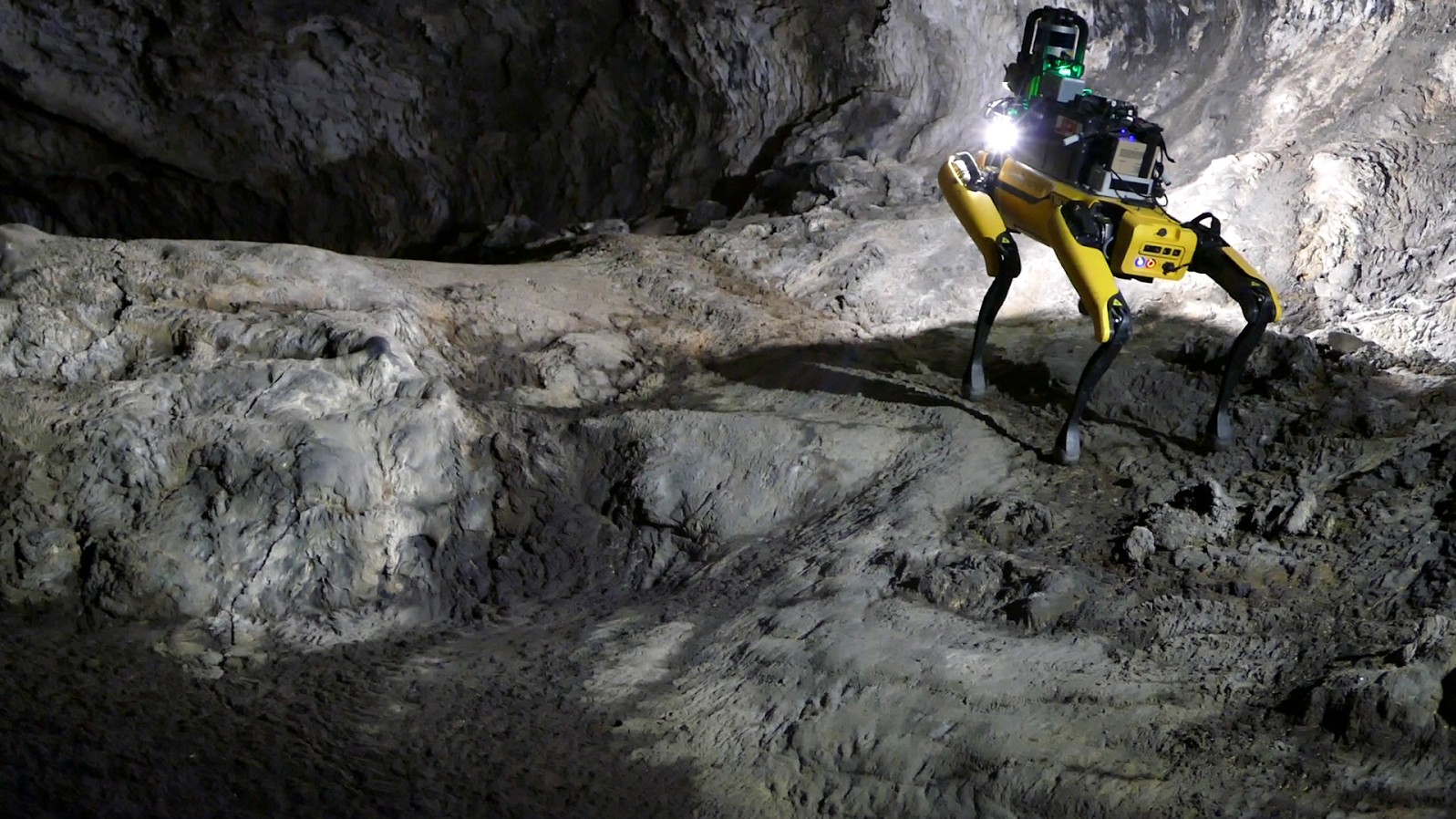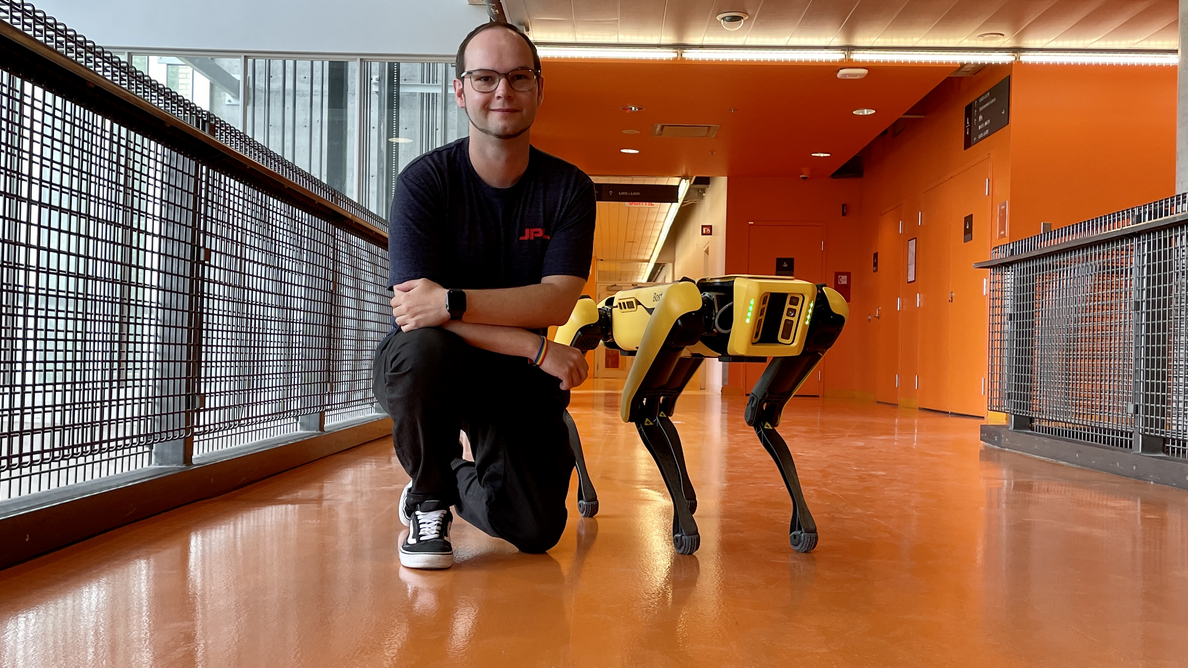Just that once, to see Earth from above
Marcel Kaufmann is about to literally reach for the stars. Presently 31, Marcel graduated from h_da in optical engineering and image processing, to commence his doctorate in Computer Engineering – focusing on space robotics – at the Polytechnique Montréal in Canada in 2017. Just to round things off, he also works as a guest researcher for NASA at the renowned ‘Jet Propulsion Laboratory’ in California. And not to be left out of things, he’s also determined to fulfil a childhood ambition by applying for an astronaut training course with ESA, the European Space Agency.
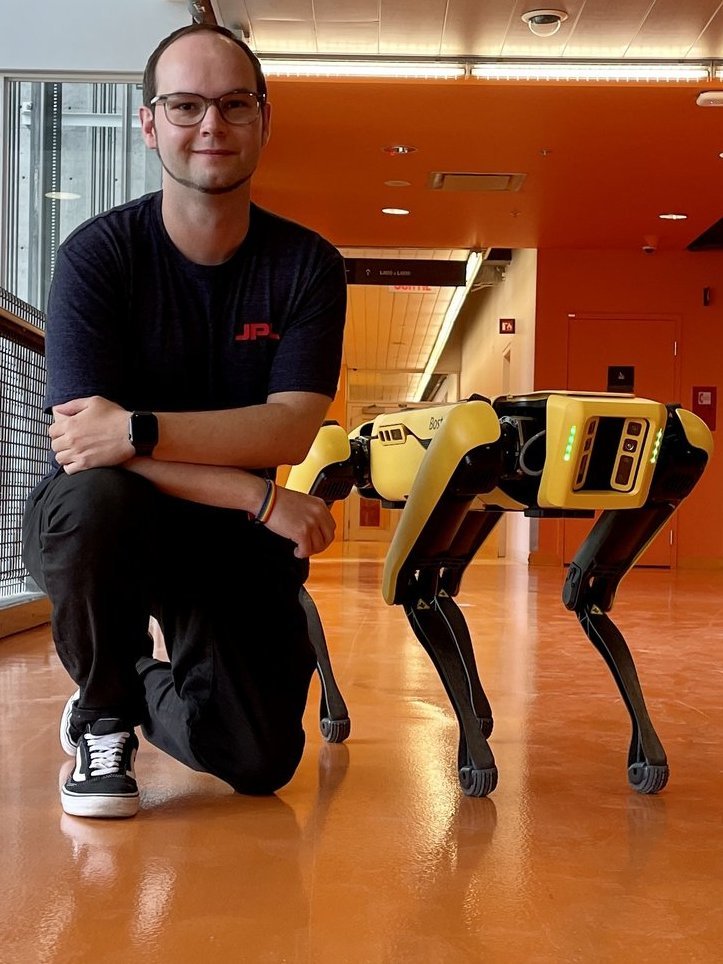 Marcel Kaufmann kneels next to a so-called Mars Dog
Marcel Kaufmann kneels next to a so-called Mars Dog
Many boys see themselves becoming train drivers, or perhaps firemen, when they grow up. Marcel Kaufmann aimed slightly higher. He already began to see the stars, the moon, the heavens differently at junior school. “I’ve always dreamt of being an astronaut, of being able to look down upon the earth from up high.” Having worked hard, this exotic dream would now seem to be within his reach.
One of only two German participants, Marcel won a competition, whilst still at school, to take part in a two-week course at the Space School of the NASA, the American space agency, in Houston. “It was a real turning point in my life.” That was it. From now on the moon, Mars and distant galaxies would form the crux of his career. Kaufmann grew up in a village of 400 inhabitants in the Schwalm-Eder district in central Germany. “I yearned to travel abroad, to see what’s out there.” And precisely this longing has propelled him forever onwards, for his CV is clearly the path of a real high-flyer. You Zoom Marcel Kaufmann at his home office in Canadian Montreal. Behind him, a multi-coloured image of a galactic cloud hangs above a model Saturn V rocket, the vehicle used as transport for the moon landings. h_da alumnus Kaufmann has been researching for his doctorate in Computer Engineering – focusing on space robotics – at the Polytechnique Montréal since 2017.
Attending the h_da due to the chance to specialise
Marcel Kaufmann studied at h_da between 2011 and 2016. Having begun an engineering course at the TU Darmstadt, he felt drawn to pursue the highly specialised courses in optical engineering and image processing at the h_da. His original course, which focuses more on car manufacturing, didn’t really appeal to him. So he switched universities, to where an ambience of smaller research groups, along with supportive proximity to professors themselves, was more to his liking. “I was able to choose what I focussed on.” He was excited by photographic technology in combination with programming – especially when employed to process images taken via satellites, technologies useful both earth-bound or in space. Satellites can be extremely effective and efficient in watching over gas and oil pipelines, or to monitor climatic developments. Kaufmann began to earn a decent living through programming quite early on, having set up an IT firm aged 18 in order to finance his studies. Our alumnus comes from a working-class background. He is the first in his family to go to university and then pursue a scientific career: “everyone in my family is really proud”, he tells.
First place, in Holland
Marcel stood out during his degree course. Obviously highly motivated, he once helped a professor he was accompanying to a congress in Oldenburg, in northern Germany, by stepping off the train they were travelling on to retrieve the correct measurement data they needed, then still turn up at the congress, on time, the following morning. He gained a 1 for his master thesis at the h_da. His thesis was drawn up in cooperation with the Dutch company ‘Science & Technology’, who cooperate with ESA, and he stayed on to work as a software engineer in Delft, for a while. As he explains: “only having a master’s degree, though, meant I wasn’t part of the upper ranks, so I decided to go for a doctorate” – meaning he eyed up the h_da. “In scientific circles you really do need your Doctor’s degree in order to get on.”
Becoming a Doctor in Canada
Kaufmann was mainly involved in projects concerning space travel, scientific research and defence resources in Delft. His work eventually attracted the attention of his future mentor at the technical university Polytechnique Montréal in Canada, where the 31 year old has enjoyed researching Computer Engineering and Astronautic Robotics since autumn of 2017. His thesis is about symbiotic human to multirobot-systems interfaces, as well as exploring how interaction between humans and machines could be improved. Kaufmann is currently employed at the Making Innovative Space Technologies Laboratory based in Montréal, abbreviated as MIST Lab.
His research is about a human controlling an entire swarm of robots at once and how that affects his "mental capacity to work", he explains. The aim of his work is to create an autonomous system that adapts to the "operator". Missions are already in gear towards the Moon and Mars employing robots, controlled from earth or an on-site team, which will be able to explore difficult terrains. This technology is desperately needed here on earth, as well, to help during disasters. Tests are due to begin at the Canadian space agency’s Mars-Simulations centre – though somewhat slowed down by Covid, as well, as Kaufmann himself will tell you!
He didn’t speak a word of French
Our Darmstadt-alumnus turned up in Canada unable to speak a word of French. “Look, I stepped out into the unknown.” Montréal is, well - frenchy. Whilst English is usual language in the laboratories themselves, French is spoken elsewhere on the campus. Marcel took this in his stride, and as he says, “you get around, get things done, and I find reading things easier than discussing them.” His having studied Latin helped, for he’d never have been able to afford the cost of a language course. Fortunately, this wasn’t necessary. Aged 31 Marcel now receives a Vanier Scholarship to the tune of $20 thousand Canadian dollars, to continue for the next few years. “I’d never be able to complete my doctorate here in Canada otherwise!”
Shuttling between Canada and California
Kaufmann is making a name for himself in robotic research circles. A professor associated with MIT, who also works at the Jet Propulsion Laboratory (JPL) in California – which is also known for the cult TV series "Big Bang Theory" – asked the Darmstadt alumnus to apply as a visiting scholar at the end of 2019. "That was great, but I still had to get my application accepted first," he says. When the acceptance came, the joy was huge. "I was thinking: Wow." He began to commute between Canada and Pasadena, close to Los Angeles, in March 2020. Here he collaborates with other scientists from the Canadian and European space agencies to develop technologies being called for by missions to Mars that are in the pipeline. The team call themselves the ‘CoSTAR’, and they’re busily submitting to the ‘DARPA Subterranean Challenge’ in order to be in line for the few millions set to be won in the competition. The team has developed robots to autonomously explore tunnels and lava caves. The so-called Mars dogs are on the move on four legs and with intelligent sensors in the form of a backpack. Kaufmann spends quite a few months researching and working hard in California each year. Contingent to the whims of the global pandemic, he presently works from home, in the knowledge he will soon be back, fervently researching in California – underpinning the work on his doctorate in Montréal.
To dream, to be an Astronaut
To live and work in Canada and California – pretty much dream-time. But as Marcel explains “this is just, sort-of, ‘getting-there’”. He feels this opportunity to guest at NASA is offering him a key. He’s not being paid, but Marcel Kaufmann knows what he’s aiming for: he’s applied for the astronaut training course with ESA. He’s already got the diving licence, the requisite health certificates and scientific qualifications, so along with probable ten to twelve thousand other applicants, Marcel’s hoping to high heaven to be able to grasp and hold on to one of the six places (or at least one of the 20 places on reserve) ESA has put up for display. As he says “I want to play a part in developing and employing the technology of the future”. Getting to know space travel as an astronaut would be the missing perspective. The fulfilment of his childhood dream.
But what if it doesn't work out? “You always need a plan B.” Kaufmann could conceivably take up a position, postdoc, at ESA’s European astronaut centre (EAC) in Cologne. He plans to have completed his doctorate by the summer of 2022.
Author
Astrid Ludwig
July 2021
Translation:
Paul Comley
